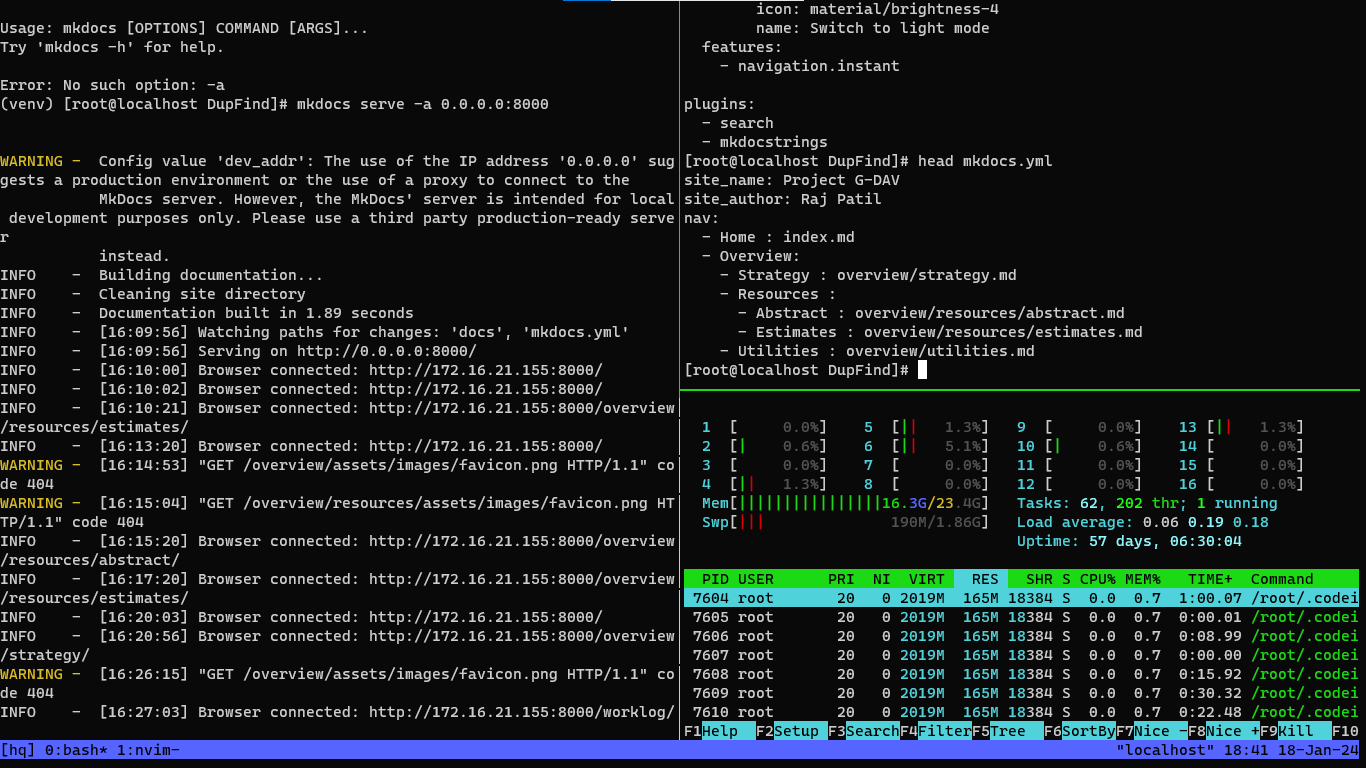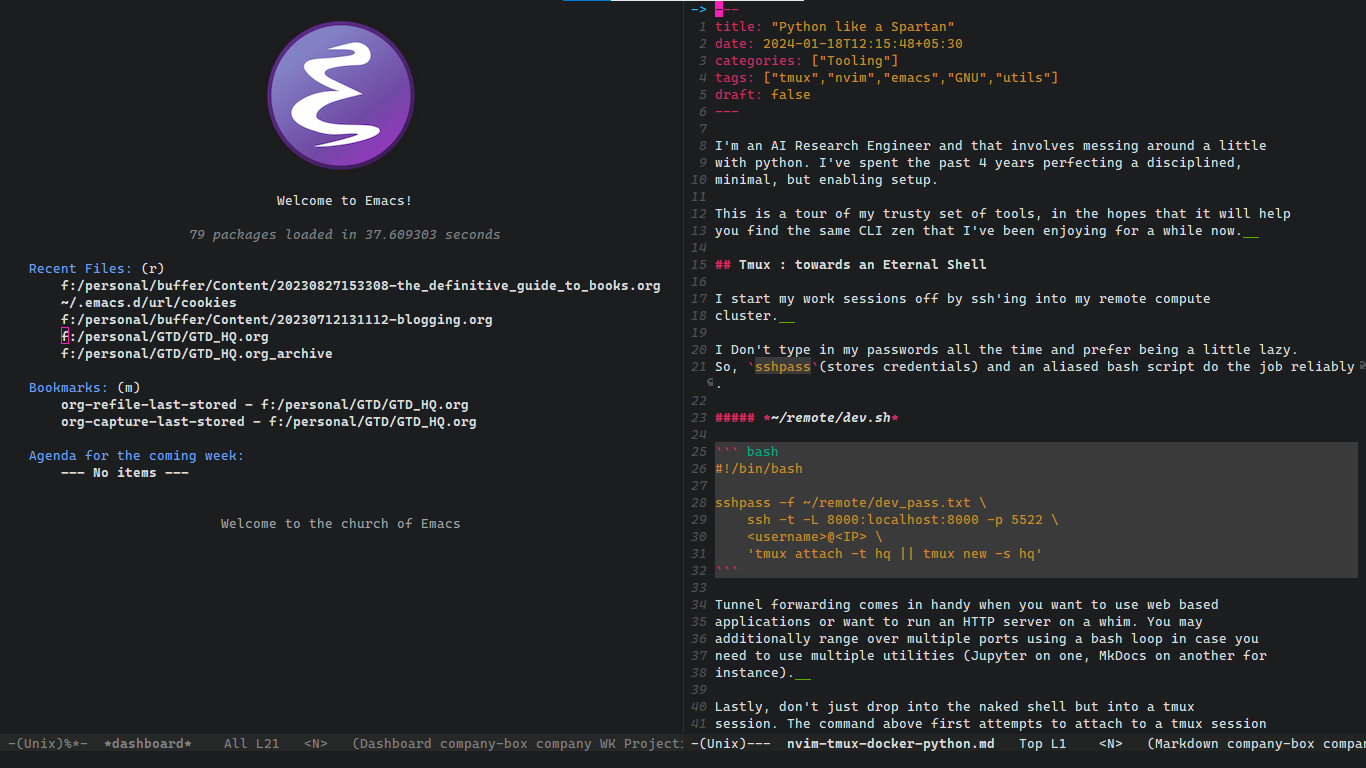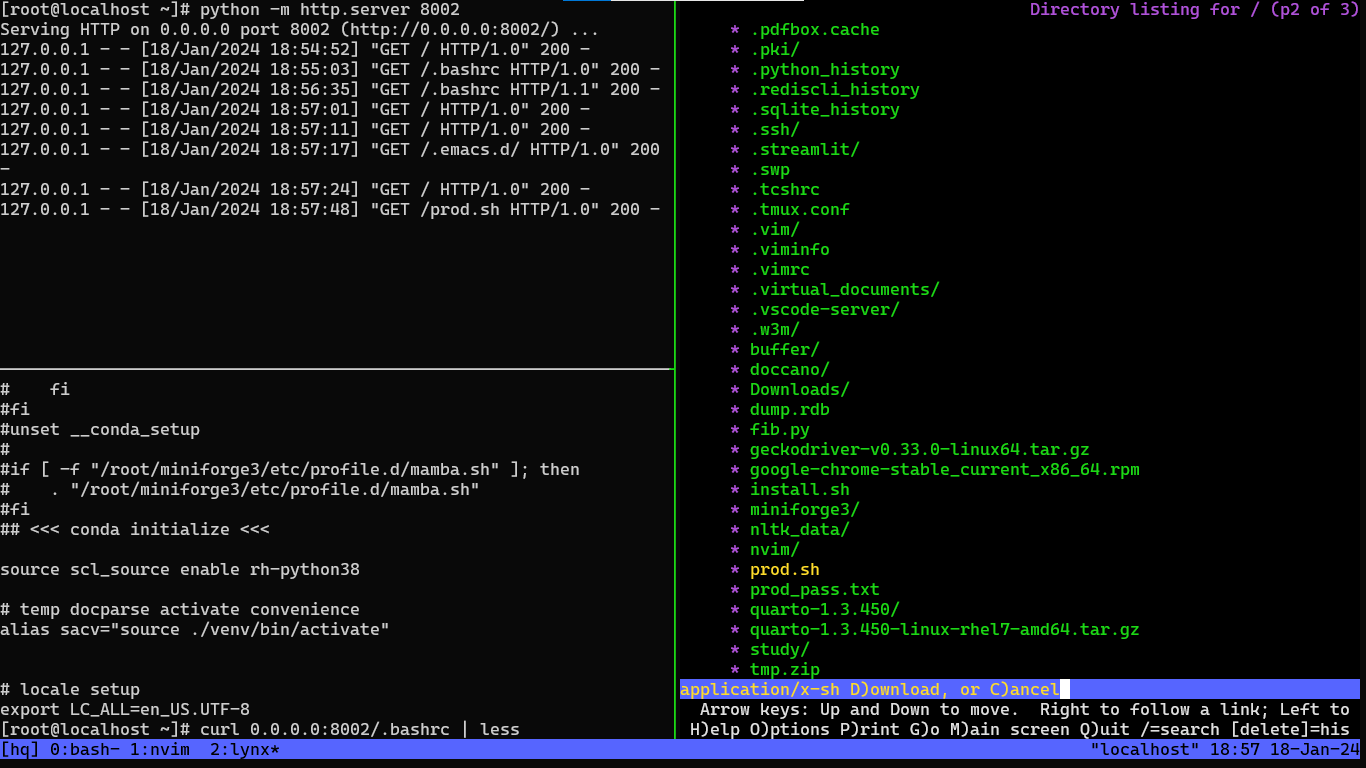Python like a Spartan
I’m an AI Research Engineer and that involves messing around a little with python. I’ve spent the past 4 years perfecting a disciplined, minimal, but enabling setup.
This is a tour of my trusty set of tools, in the hopes that it will help you find the same CLI zen that I’ve been enjoying for a while now.
Tmux : towards an Eternal Shell

I start my work sessions off by ssh’ing into my remote compute cluster.
I don’t type in my passwords all the time and prefer being a little lazy.
So, sshpass(stores credentials) and an aliased bash script do the job reliably.
~/remote/dev.sh
#!/bin/bash
sshpass -f ~/remote/dev_pass.txt \
ssh -t -L 8000:localhost:8000 -p 5522 \
<username>@<IP> \
'tmux attach -t hq || tmux new -s hq'
Tunnel forwarding comes in handy when you want to use web based applications or want to run an HTTP server on a whim. You may additionally range over multiple ports using a bash loop in case you need to use multiple utilities (Jupyter on one, MkDocs on another for instance).
Lastly, I don’t just drop into the naked shell but into a tmux session. The command above first attempts to attach session named “hq”. Failure results in the creation thereof. Success short-circuits the latter’s execution and you’re into whatever you were last working on.
*~/.bashrc
alias dev="~/remote/dev.sh"
alias avx="~/remote/avx.sh"
alias avx_prod="~/remote/avx_prod.sh"
alias avx_resch="~/remote/avx_research.sh"
Finally, a bunch of aliases further reduce your time-to-shredding-the-remote-file-system. If you’re already investing into how you access your clusters, when you actually open up your workspace, you gotta …
.. Edit like you mean it

I’ve used my fair share of editors to finally have a favourite when it comes to working remotely.
For personal projects, I use evil gccemacs and won’t ever stop doing so. However, for remote work, nothing beats the sleekness of vim (using neovim, to be specific)

Emacs with tramp mode just doesn’t cut it (I haven’t tried running CLI emacs remotely because my keybindings are a tad too crazy for a terminal emulator to handle correctly).
To summarize, emacs is the souped up tank and neovim + tmux makes for the vagabond-warrior-way to get on with your job surgically.
Given we’re pretending to be spartans, Neovim + Tmux it is.
Btw, going minimal doesn’t mean you’re going unprepared and compromised. Neovim is relatively minimal to Emacs but it gets the job done and a whole lot more.
Moreover, my experience with one enhances my workflow in the other (I use evil emacs and nvim with Neogit (Neovim’s Magit), for instance (one of several)).
Also .., don’t even think of VS code, just don’t…
Contain your Enthusiasm
Working on multiple projects might call for working on the same libraries with different versions. This may be handled easily if you’re working in a uniform ecosystem, say only with python libraries (check out micromamba -> that’s pretty spartanish) but throw in other dependencies that a polyglotic application might ask for and you’ll quickly realize the nightmare you’ve signed up for.
So.., check out docker and how containers help segregate your mess.
Miscellaneous
I also use several utilities that aren’t particularly a part of any specific umbrella-of-a-tool.
A Simple HTTP server
python -m http.server <port>
That exposes your current filesystem and has been a convenient tool when I want to share files across my research cluster.
You may just wget the specific file from the server or browse the
directory listing using lynx. I’d recommend you reserve this method
for smaller files that you’d like to be accessible across
your cluster. rsync or scp are the usual alternatives
otherwise. Of course you could always just access that in a “normal”
browser if you want to access these on your GUI host.

I personally prefer documenting my code and my thought process the
same time I’m building something so I always fire up an auto doc-er.
I use mkdocs and given that we’re in tmux, my
documented approaches and thought processes are always accessible
over my IP:port on the research cluster. So that is also how I
provide context to my mates about what I’m up to.
GNU coreutils
The GNU Core Utilities are the basic file, shell and text manipulation utilities of the GNU operating system. These are the core utilities which are expected to exist on every operating system.
For instance, to quickly check the number of entities in a parent entity I’d use an enlister, piped into the line count variant of wc.
cat records.csv | wc -l
tree cats-and-dogs-directory | wc -l
There are some days when I need to manipulate a file in a very old docker container that doesn’t have vim. sed does come in handy such days and has saved me quite some time, numerous times.
sed -i '/good_sentinels/s/42/1729/' answer_to_everything.org
Say there’s a zombie process lying around that might need a quick kill: grep and awk then come in handy :
ps aux | grep 'Z' | awk '{print $2}' | xargs kill -9
This is just scraping the surface with what you can do with the core utils. Considering the powerful interface capabilities of these with vim and you’ve got yourself an enviable setup running at a fraction of the compute of what your run of the mill IDE consumes.
Farewell, for now, and good luck sharpening your technical repertoire…
Tools don’t make the Trader, but …, they kinda do…
– I made that up
P.S.
I side with evil gccemacs in the editor wars…